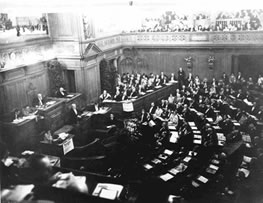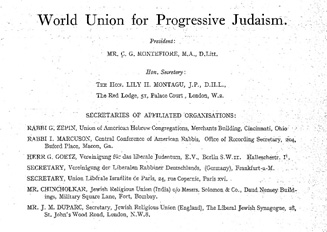Under the dynamic leadership of Lily Montagu, its honorary secretary, and Claude Montefiore, its first president, the World Union for Progressive Judaism was established in London in 1926. The World Union set out to establish a movement presence wherever there were Jewish communities wishing to renew or establish their commitment to a contemporary expression of the Jewish religion and its traditions.
The very first international convention of the World Union for Progressive Judaism took place in 1928 when leaders of the newly formed organization gathered in Berlin – the birthplace of Reform Judaism. The goal was to unite into a permanent union the various progressive Jewish movements already in existence in countries around the world.
The Reform movement quickly took a firm hold in North America, becoming the largest Jewish movement on that continent and a stalwart constituent of the World Union. A year after Rabbi Solomon Freehoff became president of the World Union in 1959, the administrative offices of the organization moved from London to New York.
In 1973, with the growing commitment to building a Progressive movement in Israel, the organization moved its international headquarters to Jerusalem under the leadership of its then Executive Director, Rabbi Richard Hirsch. In 1976 the World Union became the first international Jewish religious organization to affiliate with the World Zionist Organization and the Jewish Agency for Israel.
In 1979, Netzer Olami, the world Progressive youth movement was founded. “Netzer” is an abbreviation for Noar Reformi v’Tzioni – Reform Zionist Youth.
As liberal communities around the world became established around the world – including liberal streams of Judaism known variously as Reform, Progressive, Liberal, and Reconstructionist – a global network has become increasingly more important. From Latin America to South Africa, Spain to Singapore, Progressive Judaism has enjoyed a rebirth that is particularly profound in places where they had been all but extinguished or had never existed at all.
Some of the most dramatic examples took place in several countries of the former Soviet Union (FSU) after the fall of Communism. The WUPJ established a special department in 1983 to support Progressive communities in the FSU, establishing both regional and national movements that comprise over 40 Progressive congregations in Russia, Ukraine, Belarus and the Baltic States and a growing number of rabbis and youth activities and camps.
In 1997, the Tamar movement joined the WUPJ family as the platform to support activities for young adults aged 18-35. Tamar is the abbreviation for Tenu’at Magshimim Reformit – The Movement for Realizing Reform Movement Judaism.
Looking ahead, the World Union aspires to continue developing the tools and resources that allow individuals and communities everywhere to share in each other’s successes, learn from each other’s challenges, and experience the strength and unity of Klal Yisrael.
List of WUPJ Presidents/Chairs from 1926 until present
- Dr. Claude Joseph Goldsmid Montefiore (1926-1938)
- Rabbi Dr. Leo Baeck (1939-1953)
- Hon. Lily H. Montagu (1954-1959)
- Rabbi Dr. Solomon B. Freehof (1959-1964)
- Rabbi Dr. Jacob K. Shankman (1964 -1970)
- Rabbi Dr. Bernard J. Bamberger (1970-1972)
- Rabbi Dr. Maurice N. Eisendrath (1972-1973)
- Rabbi Dr. David H. Wice (1973-1980)
- Gerard Daniel (1980-1988)
- Donald S. Day (1988-1995)
- Austin Beutel (1995-2000)
- Ruth Cohen (2000-2005)
- Steven M. Bauman (2005-2011)
- Michael Grabiner (2011-2015)
- Carole Sterling (2015-2023)
- Phyllis Dorey OAM (2023-Present)
List of WUPJ Executive Directors/Presidents from 1960 until present
- Rabbi Hugo Gryn (1960-1962)
- Rabbi William A. Rosenthal (1962-1972)
- Rabbi Dr. Richard G. Hirsch (1972-1999)
- Rabbi Dr. Richard A. Block (1999-2000)
- Rabbi Dow Marmur (1999-2001)
- Rabbi Uri Regev (2002-2008)
- Rabbi Stephen Fuchs (2011-2012)
- Rabbi Daniel H. Freelander (2014-2019)
- Ambassador Rabbi David Saperstein (2019-2020)
- Rabbi Sergio Bergman (2020-Present)

